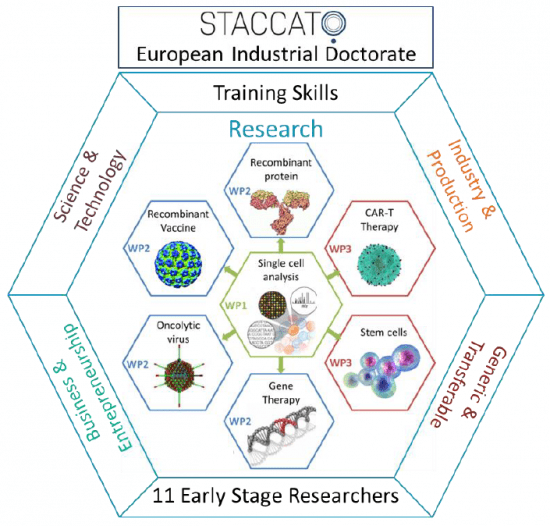European Industrial Doctorate (EID) for enhancing upstream biopharmacuetical manufacturing process development through single cell analysis
STACCATO was a European Industrial Doctorates project funded under the Marie Sklodowska-Cure Action of Horizon2020. It has been specifically designed to strengthen Europe’s innovation capacity and leadership in biopharmaceutical manufacturing science by providing world-class intersectoral training to 11 Early Stage Researchers (ESRs) and creating and applying pioneering manufacturing process development approaches for biopharmaceuticals. The STACCATO partners were united by the shared vision to utilise high-resolution data captured simultaneously from thousands of single cells to develop new manufacturing methods for biopharmaceuticals.
Over the course of the project, the STACCATO ESRs, have presented their research and outcomes at 35 scientific conferences and events, including the Falling Walls Lab Marie Skłodowska-Curie competition (ESR11), the 27th European Society for Animal Cell Culture Technology (ESACT) conference and International AIDs society as well as the Advancing Manufacture of Cell and Gene Therapies VII conference. Access some of presentations here.
During the project, the STACCATO ESRs contributed in total to 38 scientific publications comprising 12 published papers, 2 submitted papers and 24 manuscripts that are being prepared for submission to peer-reviewed journals in 2023. See the list of published papers here.
STACCATO ESRs took every opportunity to increase the project outreach through dedicated communication and dissemination activities. Including:
- STACCATO ESR blog started in December 2019 on the initiative of the ESRs themselves to share their experience as Marie Sklodowska-Curie fellows, communicate ESR research to the general scientific community and inspire students interested to pursue careers in Biopharma research.
- ESR Biotech Pitches resulted from the training event, namely a module on Essentials of Entrepreneurship. ESRs were tasked to produce pitches elaborating on their ideas addressing the pharmaceutical industry. All pitches are available online.
- STACCATO podcast was launched in November 2022 and included six episodes produced by ESRs. Through the STACCATO podcast series, ESRs not only promoted MSCA and their research but educated the audience on single cell analysis, innovative therapies, and potential developments in the future.
- Twitter account (@StaccatoEU) was set up in November 2019 to complement the STACCATO website and maximise opportunities for ESRs to train their communication skills using social media platforms. ESRs were in charge of sharing updates on the project and their activities as well as re-tweet relevant content.
- Individual activities – ESRs took every opportunity to promote STACCATO and MSCA also at the local level, including engaging with students at various events, e.g. Explore Engineering’s Showcase 2022, organising a scientific workshop at schools.
The STACCATO Wiki was first published on the project website in February 2021 and then available for the remainder of the project. The main objective of the STACCATO Wiki was to set up a searchable online platform containing basic information on relevant STACCATO research topics in the form of a ‘Glossary’ of terms.
Challenge
Overcoming the inherent heterogeneity of cells grown in vitro to deliver effective, uniform and safe biological medicines has been one of the most significant challenges faced by the industry in recent years. The STACCATO research programme was set up to develop state of the art single cell analysis methods to characterise the molecular heterogeneity of cell populations utilised in the
biopharmaceutical industry.
Objectives
Biopharmaceuticals have revolutionised the treatment of chronic diseases and its industry is under considerable pressure to produce “first-in-class medicines” in a cost-effective and safe manner. The primary objective of the STACCATO research programme was to utilise high-resolution analysis of DNA, RNA and proteins from single cells to enhance the efficiency of manufacturing processes and ensure patient safety for a range of biopharmaceuticals.
The main objectives of the STACCATO intersectoral training programme were to provide the ESRs with unique multidisciplinary scientific training by teaching them essential theory as well as developing the practical skills required to prosper in a biopharmaceutical manufacturing research environment based in either industry or academia.

With STACCATO EID partners’ scientific excellence, industrial expertise and infrastructure, the project was well set to provide a biopharmaceutical manufacturing training programme. ESRs engaged in a ground-breaking research action aiming to develop single-cell analysis methods for biopharmaceutical manufacturing, improve the performance of cells in biopharmaceutical factories and enhance manufacturing processes for cellular therapies.